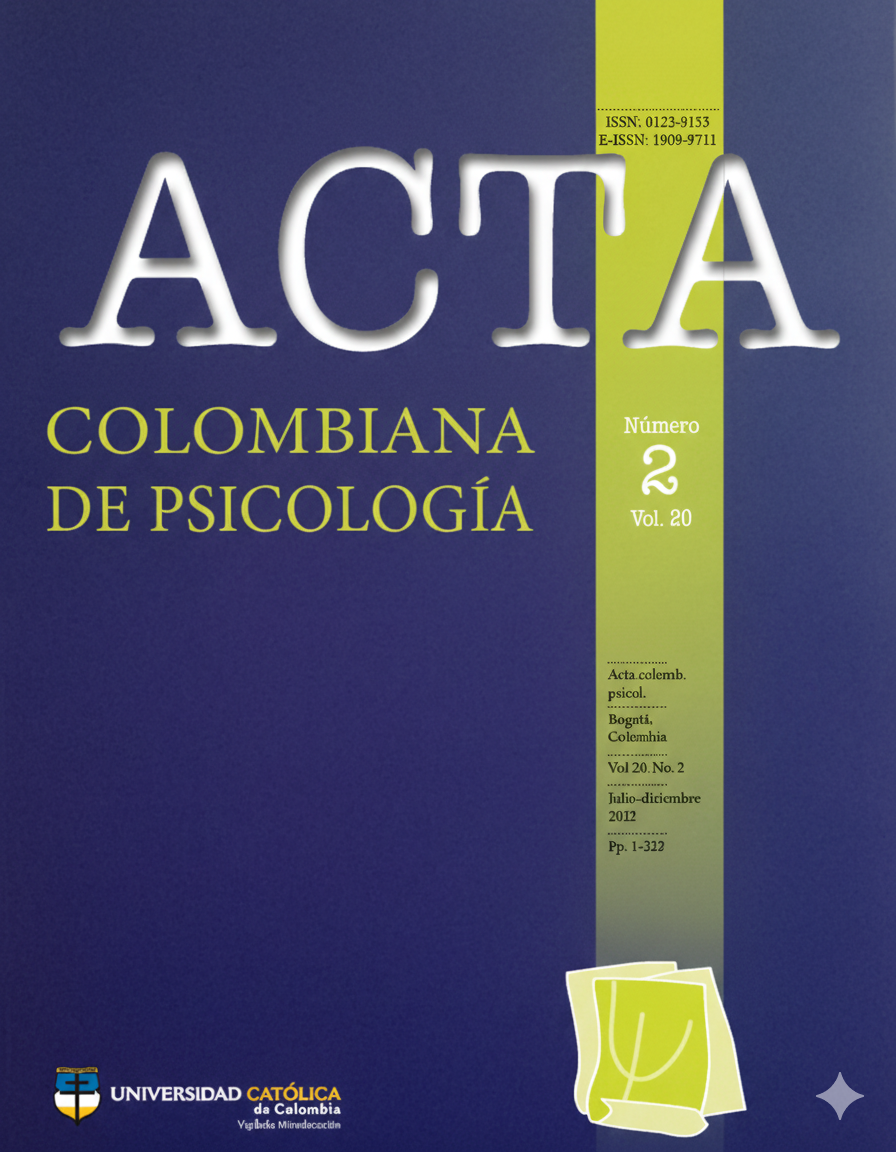Authors who publish in this journal agree to the following terms:
Acta Colombiana de Psicología complies with international intellectual property and copyright laws, and particularly with Article No. 58 of the Political Constitution of Colombia, Law No. 23 of 1982, and the Agreement No. 172 of September 30, 2010 (Universidad Católica de Colombia Intellectual Property Regulation).
The works published in the journal are licensed under a Creative Commons Attribution–NonCommercial–ShareAlike 4.0 International License, which allows third parties to use the published material provided that they acknowledge the authorship of the work and its first publication in this Journal.
Abstract
Although there are studies pointing to some attitudinal differences of university students towards the use of Information and Communication Technologies (ICT) based on their socio-demographic characteristics, there is little research regarding how these variables influence the use of ICT in Psychology students. The aim of this study was to describe attitudinal factors towards ICT in Psychology students of six Chilean universities and identify differences in these factors according to demographic characteristics, knowledge and use of ICT. Participants were 184 Psychology students, aged between 20 and45 years. The instrument used was a questionnaire of attitudes towards computers, complemented with a set of questions on socio-demographic characteristics and on knowledge and use of ICT. Results show a tendency to manage medium levels of knowledge, as well as a high and medium use of ICT. Attitudes were oriented mainly towards positive aspects. A significant difference between the level of use and knowledge in the attitudinal components was found, but not on sex and age. The results of this study pose the need to maintain a positive attitude of actively incorporating ICT in psychological training.
Keywords

References
Ahumada, L. (2004). La Experiencia del Campus Virtual y la Evaluación del Uso que realizan los Estudiantes de Psicología de la Red de Internet. Revista de Psicología de la Universidad de Chile, 13(1), 21-33. DOI: 10.5354/0719-0581.2004.17460.
Área, M. (2010). ¿Por qué formar en competencias informacionales y digitales en la educación superior? Revista de Universidad y Sociedad del Conocimiento (RUSC), 7(2). Recuperado de http://rusc.uoc.edu/ojs/index.php/rusc/article/view/v7n2-area/v7n2-area
Benavides, F., & Pedró, F. (2007). Políticas educativas sobre nuevas tecnologías en los países iberoamericanos. Revista Iberoamericana de Educación, 45, 19-69. Recuperado de http://www.rieoei.org/rie45a01.pdf
Bolaños-Medina, C., & Isern, J. (2012). Análisis de las actitudes de los estudiantes hacia las herramientas informáticas de traducción asistida. Sendebar, 23, 275-300. Recuperado de http://revistaseug.ugr.es/index.php/sendebar/article/view/39
Capozza, D., Falvo, R., Robusto, E., & Orlando, A. (2003). Beliefs about Internet: Methods of Elicitation and Measurement. Papers on Social Representations, 12, 1-14. Recuperado de http://www.psych.lse.ac.uk/psr/PSR2003/12_01Cap.pdf
Careaga, M., Avendaño, A., & Careaga, M. (2007). Modelo Gestión del Conocimiento para Plataformas de Docencia Universitaria Mixta. (GC+TIC/DUM). En J. Sánchez (Ed.), Nuevas Ideas en Informática Educativa 3 (pp. 355-376). Santiago de Chile: LOM Ediciones.
Durndell, A., & Haag, Z. (2002). Computer self efficacy, computer anxiety, attitudes towards the Internet and reported experience with the Internet, by gender, in an East European sample. Computers in Human Behavior, 18, 521-535. Recuperado de http://citeseerx.ist.psu.edu/viewdoc/downloaddoi=10.1.1.460.3108&rep=rep1&type=pdf
Gallardo, E., Marqués, L., & Bullen, M. (2015). El estudiante en la educación superior: Usos académicos y sociales de la tecnología digital, RUSC. Universities and Knowledge Society Journal, 12(1), 25-37. Doi: http://dx.doi.org/10.7238/rusc.v12i1.2078
Hackos, J. T., & Redish, J. C. (1998). User and task analysis for interface design. Nueva York: Wiley.
Hergatt-Huffman, A., Whetten, J., & Huffman, W. (2013). Using technology in higher education: The influence of gender roles on technology self-efficacy. Computers in Human Behavior, 29, 1779-1786. doi: http://dx.doi.org/10.1016/j.chb.2013.02.012.
López-Mena, L. (2001). Aplicaciones de Internet en la formación de los estudiantes de Psicología: Estudio de caso. Revista de Psicología Universidad de Chile, 10(1), 9-19. Recuperado de http://www.revistapsicologia.uchile.cl/index.php/RDP/article/viewFile/18525/19554
Mas, O., & Tejada, J. (2013). Funciones y Competencias en la docencia universitaria. España: Editorial Síntesis, S.A.
Muñoz, M. (2006). Uso de tecnologías de información y comu- nicación en estudiantes de psicología. En J. Sánchez (Ed.), Nuevas ideas en informática educativa vol. 4 (pp. 163-171). Santiago de Chile: LOM.
índer, F., ÿelik, P., & Silay, I. (2011). Attitude of teacher candidates toward making computer Supported Education. Procedia Computer Science, 3, 967-971. doi: 10.1016/j.procs.2010.12.158
Onen, A. (2012). Effects of educational beliefs on attitudes towards using computer technologies. Hacettepe university journal of education, 43, 353-361. Recuperado de http://www.efdergi.hacettepe.edu.tr/makale_goster.phpid=374
Ossa, C. (2012). Percepción de estudiantes de psicología sobre la informática en su formación profesional. Acta Colombiana de Psicología, 15(1), 33-45. Recuperado de http://www.scielo.org.co/pdf/acp/v15n1/v15n1a04.pdf
Pamuk, P., & Peker, D. (2009). Turkish pre-service science and mathematics teachers? computer related self-efficacies, at- titudes and the relationship between these variables. Com- puter & Education, 53, 454-461. doi: 10.1016/j.compedu.2009.03.004.
Roig-Vila, R., Mengual-Andrés, S., Sterrantino, C., & Quinto, P. (2015). Actitudes hacia los recursos tecnológicos en el aula de los futuros docentes. Revista d?innovació educativa, 15, 12-19. DOI: 10.7203/attic.15.7220.
Sariçoban, A. (2013). Pre-Service ELT Teachers' Attitudes Towards Computer Use: A Turkish Survey. Egitimarastirma- lari-eurasian journal of educational research, 13(53), 59- 78. Recuperado de http://www.ejer.com.tr/0DOWNLOAD/pdfler/eng/asar%C4%B1%C3%A7obaneng53.pdf
Yalman, M., & Tunga, M. A. (2014). Examining the Attitudes of Students from State and Foundation Universities in Turkey towards the Computer and WWW (World Wide Web). Egitimvebilim-education and science, 39(173), 221-233. Recuperado de http://egitimvebilim.ted.org.tr/index.php/EB/article/download/2222/687

































